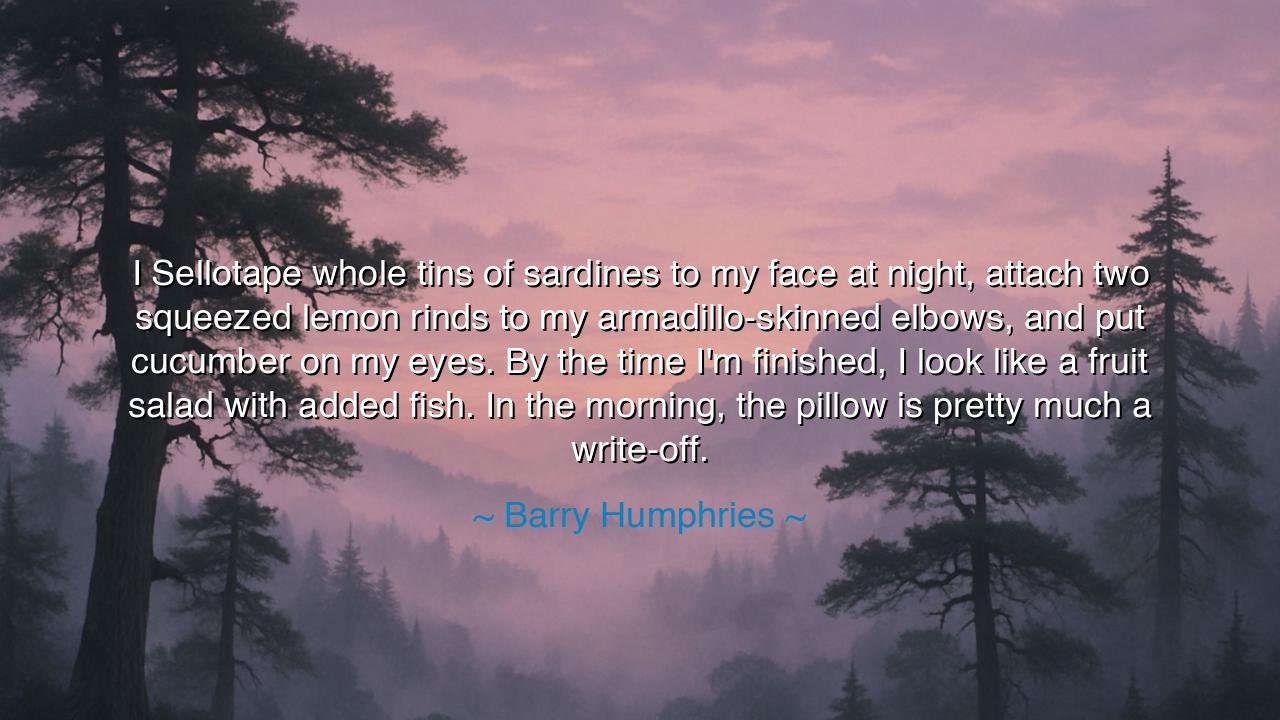
I Sellotape whole tins of sardines to my face at night, attach
I Sellotape whole tins of sardines to my face at night, attach two squeezed lemon rinds to my armadillo-skinned elbows, and put cucumber on my eyes. By the time I'm finished, I look like a fruit salad with added fish. In the morning, the pillow is pretty much a write-off.






“I Sellotape whole tins of sardines to my face at night, attach two squeezed lemon rinds to my armadillo-skinned elbows, and put cucumber on my eyes. By the time I’m finished, I look like a fruit salad with added fish. In the morning, the pillow is pretty much a write-off.” Thus spoke Barry Humphries, the great satirist and comedian, famed for creating the immortal character Dame Edna Everage. In this passage of flamboyant exaggeration, we hear not merely humor, but a deeper truth disguised in jest: the lengths to which men and women will go in pursuit of beauty, and the absurdity of that pursuit when taken too far. By cloaking wisdom in laughter, Humphries reminds us that the human vanity for youth and appearance can often border on the grotesque.
The origin of this saying lies in Humphries’ lifelong art of parody. Through Dame Edna and other characters, he delighted in skewering the habits and obsessions of modern society—its hunger for fame, its insecurities, its cult of beauty. The sardines, the lemon rinds, the cucumber slices—all are a comical magnification of beauty rituals familiar to many. Beneath the absurd image of a “fruit salad with added fish” lies a cutting critique: that much of our frantic pursuit of youth is as irrational and messy as smearing sardines across one’s face. Yet by wrapping his insight in comedy, Humphries makes his audience laugh first and reflect later.
The ancients themselves would have smiled knowingly at this. In Rome, women applied powdered lead to whiten their skin, even though it poisoned them. In Egypt, Cleopatra bathed in milk, believing it preserved her beauty. The Greeks used crushed mulberries as rouge, while others rubbed crocodile dung upon their skin. These practices, though strange to us, are no less bizarre than sardines and lemons, and they show that across ages, the pursuit of appearance has led mankind into folly. Humor, then, becomes the mirror that shows us our absurdity.
History offers another lesson in the tale of Marie Antoinette, whose extravagant beauty routines and masks of luxury made her the symbol of decadence. While peasants starved, she adorned herself with creams, powders, and perfumes. Her rituals became not only a matter of vanity but a political weapon against her, showing how obsession with surface can blind one to deeper truths. Humphries, with his sardine-mask parody, touches the same theme: that vanity pursued to extremes is costly, and the price is not only a ruined pillow, but perhaps also dignity, perspective, or compassion.
From this, we learn that humor is often the sharpest teacher. Absurdity reveals truth. When Humphries describes himself as a fruit salad with added fish, he is not merely inviting laughter; he is inviting reflection. What are the sardines and lemons of our own lives? What rituals do we perform, hoping to preserve what must eventually fade? And is the cost worth it? Such questions are not answered by lectures, but by the mirror of satire.
The lesson, then, is not to despise beauty, nor to abandon care for the body, but to recognize the folly of obsession. True beauty is not maintained by sardines nor by poisons, but by character, humor, and grace. To laugh at ourselves is itself a kind of beauty, for it frees us from chains of vanity. The skin may wrinkle, the body may fade, but the spirit that can laugh at itself never grows old.
Practical wisdom follows: tend to your body, but tend even more to your spirit. Do not let your pursuit of appearance become so ridiculous that you forget joy, compassion, and wit. And when you see absurdity in yourself or others, laugh—kindly, wisely, and without cruelty. For laughter is not only medicine but revelation. Humphries’ sardines and lemons remind us that much of what we cling to in vanity is as foolish as his fish-laden face, and that the truest beauty lies not in perfection, but in the courage to laugh at imperfection.
Thus, remember Barry Humphries’ words. Beneath the humor, he teaches us that laughter can strip vanity of its power, that absurdity can reveal wisdom, and that the most radiant face is not the one covered with sardines, but the one lit with joy.






AAdministratorAdministrator
Welcome, honored guests. Please leave a comment, we will respond soon